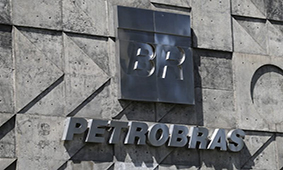
Brazil pre-salt flops prompt calls for PSC rethink

Petrobras teamed up with a Chinese partner to take just one of the five exploration blocks up for grabs in the sixth production-sharing round. The TOR round awarded two of four blocks with established reserves, one to Petrobras and the other to Petrobras and Chinese partners (see table).
The outcome further reinforces the deep commercial ties between Brazil and China, which already accounts for three-quarters of Petrobras' crude exports. But in both rounds, firms that have previously featured prominently in Brazilian upstream tenders — including Shell, Norwegian state-controlled Equinor, Spanish-Chinese joint venture Repsol-Sinopec and Portugal's Galp — stayed away.
Petrobras and China's CNODC, a subsidiary of state-owned CNPC, bid unchallenged for Santos basin block Aram, which is estimated to hold 29bn bl of unrisked in-place oil reserves. The pair offered the minimum 29.96pc share of profit oil and the fixed signing bonus 5.05bn reals ($1.24bn). Petrobras took an 80pc operating stake and CNODC 20pc. In the TOR round, the pair joined Chinese state-owned CNOOC to pick up the 350,000 b/d Buzios field with a record minimum signing bonus of R68bn. The government says that the 7 November round wraps up a pre-salt investment cycle that succeeded in diversifying Brazil's upstream sector, long dominated by Petrobras. Pre-salt reserves are forecast to drive Brazil's oil production to around 7mn b/d by 2030, from 3mn b/d now.
US and European firms complain that the assets offered in the back-to-back auctions were too pricey — they have long argued in favour of concession terms rather than the PSC model that governs acreage within Brazil's so-called pre-salt polygon. Government officials grumble that Petrobras had exercised its exclusive right of first refusal for three of the PSC blocks, but only bid for one.
"We always make an assessment of the condition of return, risk, financing. As there was no-one participating, we ended up having no way to exercise the pre-emptive right," Petrobras upstream director Carlos Alberto Pereira de Oliveira says, adding that the company was not obliged to bid.
Last rights
Petrobras retained a right of first refusal after the 2016 removal of a rule that gave the company a minimum 30pc operating stake in all pre-salt assets. The government says the right also stifled competition in the TOR round. Renata Isfer, executive hydrocarbons secretary for the mines and energy ministry, says the government supports ending Petrobras' right of first refusal, but is not considering any radical changes to contract models.
Government officials have spoken publicly about scrapping the polygon and allowing national energy policy council CNPE to make case-by-case decisions on where PSCs should apply. Others are now talking more openly about pushing for changes that would eliminate the production-sharing model adopted in 2010.
Despite the absence of the majors and European oil firms from this month's dual auctions, industry executives say Brazil's pre-salt play is just getting started, and recent hiccups had more to do with an ambitious auction schedule rather than fading investor enthusiasm. "Now is the time to take returns out of these investments, this is normal," oil regulator ANP's head, Decio Oddone, says.
The government is likely to sweeten terms for all areas not awarded before reoffering them, probably alongside acreage included in four more upstream offers planned through 2021.


Gold price edges up as market awaits Fed minutes, Powell speech

Glencore trader who led ill-fated battery recycling push to exit

Emirates Global Aluminium unit to exit Guinea after mine seized

Iron ore price dips on China blast furnace cuts, US trade restrictions

Roshel, Swebor partner to produce ballistic-grade steel in Canada

US hikes steel, aluminum tariffs on imported wind turbines, cranes, railcars

Trump weighs using $2 billion in CHIPS Act funding for critical minerals

EverMetal launches US-based critical metals recycling platform

Afghanistan says China seeks its participation in Belt and Road Initiative

Energy Fuels soars on Vulcan Elements partnership

Northern Dynasty sticks to proposal in battle to lift Pebble mine veto

Giustra-backed mining firm teams up with informal miners in Colombia

Critical Metals signs agreement to supply rare earth to US government-funded facility

China extends rare earth controls to imported material

Galan Lithium proceeds with $13M financing for Argentina project

Silver price touches $39 as market weighs rate cut outlook

First Quantum drops plan to sell stakes in Zambia copper mines

Ivanhoe advances Kamoa dewatering plan, plans forecasts

Texas factory gives Chinese copper firm an edge in tariff war

Energy Fuels soars on Vulcan Elements partnership

Northern Dynasty sticks to proposal in battle to lift Pebble mine veto

Giustra-backed mining firm teams up with informal miners in Colombia

Critical Metals signs agreement to supply rare earth to US government-funded facility

China extends rare earth controls to imported material

Galan Lithium proceeds with $13M financing for Argentina project

Silver price touches $39 as market weighs rate cut outlook

First Quantum drops plan to sell stakes in Zambia copper mines

Ivanhoe advances Kamoa dewatering plan, plans forecasts

















